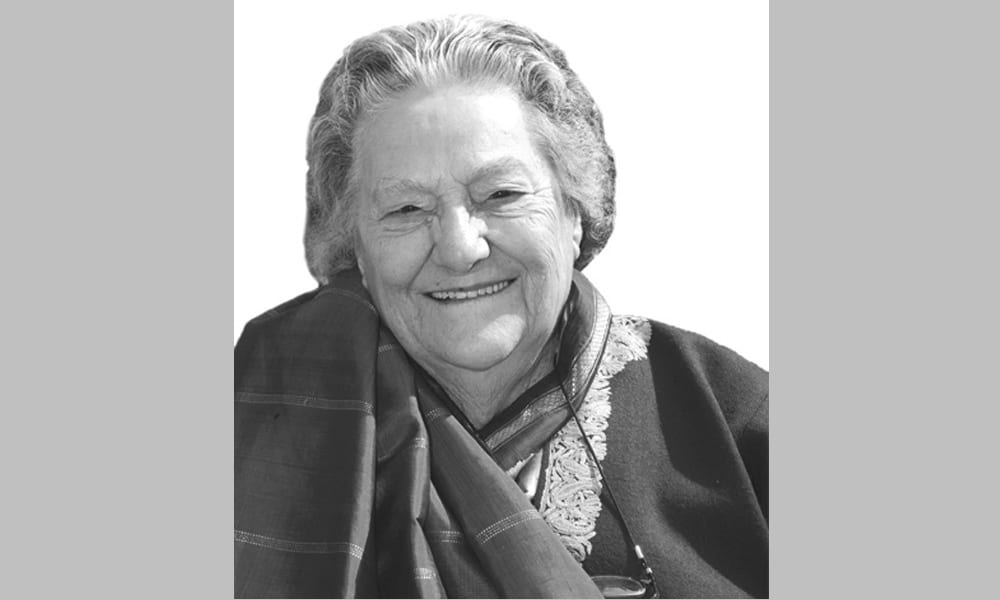

Veteran educationist and Founder
Springdales Group of Institutions
Dr Rajni Kumar a veteran educationist and Founder of Springdales Group of Institutions, has been closely associated with education for over seven decades now. Having seen various twists and turns in the evolution of education system in India, as also elsewhere, Dr Rajni talks about what’s best to shape up the young minds. Excerpts from an interview with Elets Technomedia (ENN)
You have been a veteran educationist, who has seen the birth of the Indian Nation. What has been your experience of transition from a British education era to that of an indigenous one?
I came to India in 1946, just a year before India won its freedom after waging a glorious struggle for more than 200 years against the British colonial rule. An educational system is always a microcosm of the sociopolitical structure of the society, in which it operates, and the British Education System in India was meant essentially to fulfi l the objectives of British Colonial Rule and to produce an army of clerks and pen pushers to run the administration. As for the upper classes and castes in accordance with Macaulay’s famous “Minute on Indian Education”, the idea was for them to imbibe the innate culture and lifestyles of the British rulers and become “brown sahibs”. The education imparted was stereo-typed, academic textbooks and examination-oriented and very bureaucratic.
As freedom dawned, there was a tremendous feeling of exuberance. Fresh wind was blowing and there was a promise of a new day, a new India and a new world opening up before the country. One of the great urges and aspirations of the people was for Education. The British had left behind a huge legacy of poverty and illiteracy. The literacy rate at that time was only l8 per cent and educational facilities were totally inadequate for a large and diverse country.
After freedom, the education system had to be remoulded in tune with the needs of a burgeoning Republic. Although the basic educational structure did not change, India’s constitutional goals of secularism, socialism and democracy had to be incorporated and worked upon. A cultural renaissance began to take shape, and a huge programme of quantitative expansion of facilities was initiated, such as building of schools-colleges, teacher training colleges and enrolment of students. Sadly though, not enough attention was paid to qualitative improvement or to the base of the educational ladder, the primary schools, which even today are the weak areas of the state system of education.
From Sister Nivedita to Miraben to Dr Annie Basant, a galaxy of women leaders from the UK have come and served India. What was your inspiration for choosing to serve India through education?
Right from childhood, I felt an affi nity with the darker skinned races of Africa and India, maybe because of my black hair and swarthy skin inherited from my Welsh father. As I grew into a teenager, I began to feel an aversion about “Empire Day” and later empathised with the humiliations of people in India suffering under colonialism. I read about the great movement of liberation under Gandhiji in India, and became a supporter of these human struggles and a social activist. It, therefore, followed the natural sequence of events at the University in England. I joined the India Society of the L.S.E., fell in love with an Indian Barrister and fellow social activist Yudhister Kumar, who swept me off my feet and into India.
I stayed in a military cantonment in North India just after freedom when the British army had left India and the Indian Army was coming up with their families and needed education for their children. The school house was there, but locked up and no one to run it. Their eye fell on me. Not listening to my protestations that I knew little about education or the Indian culture, and was just 25 years old, they insisted that I run the school for the Army. Well, I took up the challenge as a great learning experience and that decision became a defi ning moment in my life.
Founded in 1955, Springdales continues to be an eminent educational institution with a limited set of five instances. What has been your founding philosophy in nurturing these nurseries of talent?
Springdalian education is primarily based on the educational philosophies of great educators of both West and East, Bertrand Russell, Badley, Maria Montessori and John Dewey as well as the educational thoughts of Gandhiji and Tagore. Underpinning our educational work is our motto “Vasudhaiva Kutumbakam”, meaning “The World is a Family”. This lies at the core of our multi-dimensional curriculum and value system. It teaches the students to become good family members, supportive community dwellers, proud Indians and caring members of the whole family of humankind working with a spirit of Internationalism and socially oriented.
Dubai, an education destination in the Middle East, has Springdales, too. What prompted you to expand to the Kingdom of Arabs?
Three years ago, when I had turned 90 and thought my life’s work was done, my student Dr Navjeet Singh Anand, a Springdalian of the 1976 class, suddenly appeared from nowhere, introduced himself as the Chairman of the Goldline Group of Companies, and sought permission to build Springdales Dubai. Once a doctor, then a successful entrepreneur and now with a mission to enter the education domain, it was an offer too good to miss.
What a beautiful happy and well endowed school he has created and what a great source of delight, of joy and satisfaction the school has become to me in this last stage of my life as I see already more than l,200 happy talented children imbibing the Springdalian ethos and singing the songs of the family.
Springdalian education is primarily based on the educational philosophies of great educators of both West and East. Our educational work is our motto “Vasudhaiva Kutumbakam”, meaning “The World is a Family
One of the central themes of the upcoming Education Summit is ‘Learning from Dubai’. What are the areas for India to learn from Dubai?
There are many things we in India can learn from it:
- Firstly, the high premium the country places on Education, as a valued tool for development, for the individuals and for the country and the resources they pour into it;
- Dubai has a large variety of educational institutions that have been allowed to be built on its soil, catering to the different needs of the children of the expats of the Indian community and for their own Emirati population. They lay emphasis on high quality performance in all schools, including those for the local population, which is completely free and without any gross disparities and inequalities, which we fi nd in India between the majority of private and state-run institutions;
- The pride they have in their own culture and heritage, and their stress that this is given a pride of place in all schools;
- The respect and tolerance they have for other diverse cultures and ways of life;
- The importance given to law and order, for cleanliness and for putting in place the mechanisms required for enhancing not only the learning process, but all aspects of education, security and safety, health etc.; and
- Making effective use of education technology.
Technology has emerged as a key constituent in the educational ecosystem. What is your take on its adoption?
Education technology can be a very valuable tool to enhance the learning process. It can increase substantially the horizons of knowledge, speed up the process of absorption and alert the minds of our children and direct them into new channels of thought and action. It can help us with distance learning in removing the curse of illiteracy.
But there is also the dark side of the moon — its possible misuse. So, we must proceed with utmost diligence and caution and put in place all possible checks and balances to prevent its misuse, and indelible harm to the minds and bodies of children. The human element in education must always remain supreme. We must never become a slave to technology.




















